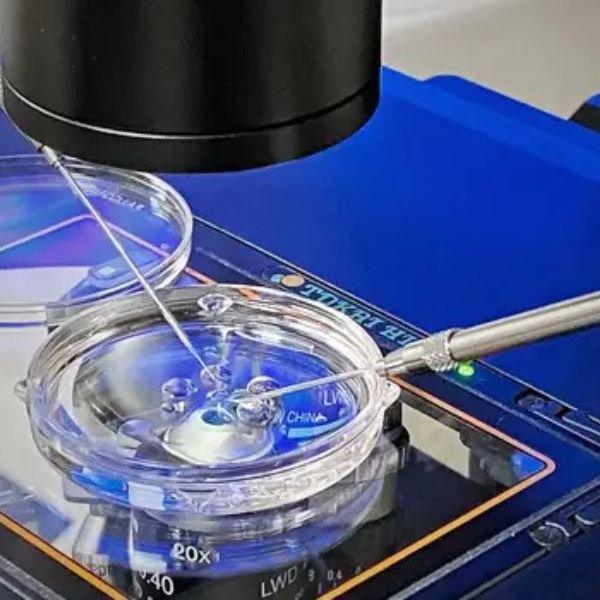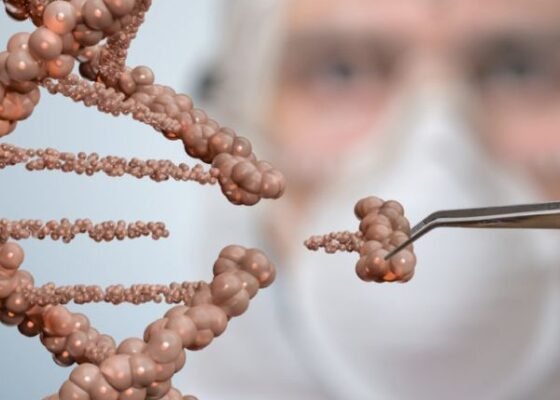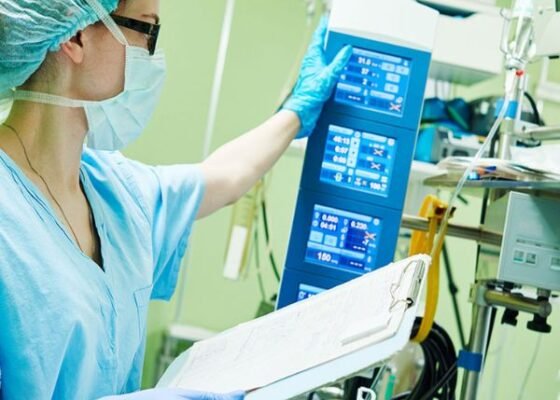MSc Clinical Embryology colleges in Bangalore
Table of Contents
ToggleWhat is Clinical Embryology?
Clinical embryology is an essential sub-discipline of reproductive biology that focuses on the study of human reproduction, embryonic development, and fertility treatments.
This rapidly evolving field plays a crucial role in the understanding of human conception, fertility issues, and the development of assisted reproductive technologies (ART).
In this article, we will explore the foundations of clinical embryology, its significance in reproductive medicine, and the key aspects of this fascinating field.
The Core of Clinical Embryology
Clinical embryology studies the earliest stages of human development, beginning with the formation of gametes (sperm and egg cells) and extending to the embryo’s implantation in the uterus. This intricate process involves several stages:
Gametogenesis: The formation of mature sperm and egg cells through a process called meiosis.
Fertilization: The fusion of sperm and egg to form a single-celled zygote.
Cleavage: The division of the zygote into multiple cells, eventually forming a multicellular structure called the blastocyst.
Implantation: The attachment of the blastocyst to the uterine wall, initiating pregnancy.
Clinical embryology plays a pivotal role in understanding the factors that influence these processes, including genetic, environmental, and hormonal factors.
The Role of Clinical Embryologists
Clinical embryologists are highly trained professionals with expertise in reproductive biology, genetics, and laboratory techniques. They work closely with fertility specialists to provide optimal treatment plans for patients experiencing infertility. Key responsibilities of clinical embryologists include:
Evaluating sperm and egg quality: Assessing the viability and quality of gametes to determine the most suitable fertility treatment.
Assisting with ART procedures: Performing techniques such as in vitro fertilization (IVF) and intracytoplasmic sperm injection (ICSI) to help couples conceive.
Embryo assessment and selection: Monitoring embryo development and selecting the most viable embryos for transfer to the uterus or cryopreservation.
Preimplantation genetic testing (PGT): Analyzing embryos for specific genetic disorders or chromosomal abnormalities before implantation.
Quality control and laboratory management: Ensuring the highest standard of care and maintaining optimal laboratory conditions.
The Impact of Clinical Embryology on Reproductive Medicine
Clinical embryology has revolutionized reproductive medicine, enabling millions of couples worldwide to overcome infertility and have children. Assisted reproductive technologies, such as IVF and ICSI, have significantly increased pregnancy success rates, offering hope to those struggling with fertility issues. Additionally, PGT allows for the identification and selection of embryos free from genetic disorders, reducing the risk of transmitting heritable conditions to future generations.
Challenges and Future Directions
Despite the remarkable advancements in clinical embryology, several challenges remain. These include ethical considerations surrounding the manipulation of human embryos, the high costs of fertility treatments, and the need for further research to improve success rates and minimize complications. Researchers continue to explore novel techniques and technologies to enhance fertility treatment outcomes and ensure the accessibility of these life-changing procedures to all who need them.
Top MSC Clinical Embryology Colleges in Bangalore
Bangalore, known as the Silicon Valley of India, is not only a hub for technology and innovation but also an epicenter for world-class education. Aspiring clinical embryologists seeking top-tier institutions for their Master of Science (MSc) degree in Clinical Embryology will find numerous excellent options in this city. In this article, we will discuss some of the leading MSc Clinical Embryology colleges in Bangalore that offer state-of-the-art facilities, experienced faculty, and exceptional learning environments.
Manipal Academy of Higher Education (MAHE), Bangalore
Manipal Academy of Higher Education is a renowned institution with a strong emphasis on research, innovation, and professional development. The MSc Clinical Embryology program offered at MAHE’s Bangalore campus combines in-depth theoretical knowledge with practical experience. The program covers a wide range of topics, including gametogenesis, fertilization, embryonic development, and assisted reproductive technologies. Students have access to well-equipped laboratories and the opportunity to collaborate with experienced professionals in the field.
Bangalore Medical College and Research Institute (BMCRI)
BMCRI, established in 1955, is one of the most prestigious medical colleges in India, with a legacy of excellence in medical education and research. The MSc Clinical Embryology program at BMCRI offers a comprehensive curriculum that prepares students for a rewarding career in reproductive medicine. The program emphasizes hands-on training, with students gaining practical experience in the latest techniques and procedures used in clinical embryology.
Rajiv Gandhi University of Health Sciences (RGUHS)
RGUHS, founded in 1996, is a leading institution dedicated to health science education and research. The university offers an MSc in Clinical Embryology that focuses on both theoretical and practical aspects of human reproduction and embryonic development. The well-structured curriculum includes courses in reproductive endocrinology, genetics, andrology, and assisted reproductive technologies. Students benefit from state-of-the-art laboratories, experienced faculty, and a strong emphasis on research and clinical skills development.
Ramaiah Medical College (RMC)
Ramaiah Medical College, a part of Gokula Education Foundation, is a respected institution with a reputation for academic excellence and research. The MSc Clinical Embryology program at RMC is designed to provide students with a comprehensive understanding of the complex processes involved in human reproduction and embryonic development. The program covers topics such as gametogenesis, fertilization, embryo culture, and preimplantation genetic testing. Students gain hands-on experience in well-equipped laboratories and have opportunities for internships and research projects.
Dayananda Sagar University (DSU)
Dayananda Sagar University is a dynamic institution with a strong commitment to innovation, research, and skill development. The MSc Clinical Embryology program at DSU is designed to equip students with the knowledge and skills required for successful careers in clinical embryology and assisted reproductive technology. The curriculum covers a broad range of topics, including reproductive biology, genetics, embryology, and infertility treatments. Students benefit from state-of-the-art facilities, experienced faculty, and a supportive learning environment.
What students study in MSC Clinical Embryology in Bangalore?
Pursuing a Master of Science (MSc) in Clinical Embryology is an excellent choice for students interested in specializing in human reproduction, fertility, and embryonic development. This advanced degree program equips students with the knowledge and skills required to excel in clinical embryology and related fields, such as assisted reproductive technologies (ART). In this article, we will delve into the core subjects and areas of study within an MSc Clinical Embryology program, providing a comprehensive overview of what students can expect during their academic journey.
Reproductive Biology and Endocrinology
A strong foundation in reproductive biology and endocrinology is essential for understanding the intricacies of human reproduction. Students study the anatomy and physiology of the male and female reproductive systems, as well as the hormonal regulation of gametogenesis, fertilization, and embryonic development. Key topics include gonadal function, menstrual cycle, and hormonal control of reproduction.
Gametogenesis and Fertilization
Gametogenesis and fertilization are fundamental processes in the formation of a new individual. Students delve into the molecular and cellular mechanisms underlying sperm and egg cell development, maturation, and function. They also explore the process of fertilization, including sperm capacitation, acrosome reaction, and the fusion of gametes to form a zygote.
Preimplantation Embryonic Development
During the early stages of embryonic development, a single-celled zygote undergoes a series of divisions and transformations, eventually forming a multicellular blastocyst. Students examine the processes of cleavage, compaction, and blastocyst formation, as well as the molecular and cellular mechanisms that regulate these events.
Implantation and Early Pregnancy
Successful implantation and early pregnancy are crucial for the establishment and maintenance of a healthy gestation. Students study the factors that influence implantation, including endometrial receptivity, embryo quality, and maternal immune responses. They also explore the physiological and hormonal changes that occur during early pregnancy.
Assisted Reproductive Technologies (ART)
ART, such as in vitro fertilization (IVF) and intracytoplasmic sperm injection (ICSI), has revolutionized fertility treatment, enabling millions of couples to overcome infertility and have children. Students learn about the principles and techniques involved in ART, including oocyte retrieval, sperm preparation, and embryo culture. They also gain hands-on experience with laboratory procedures and equipment.
Andrology and Male Infertility
Understanding the causes and treatment of male infertility is essential for clinical embryologists. Students explore the various factors that contribute to male infertility, including genetic, environmental, and lifestyle factors. They also study the evaluation and management of male reproductive disorders, such as azoospermia and oligospermia.
Genetics and Preimplantation Genetic Testing (PGT)
Genetics plays a critical role in human reproduction, with chromosomal abnormalities and genetic disorders posing significant risks to offspring. Students learn about the principles of human genetics, as well as the techniques used in preimplantation genetic testing (PGT) to identify embryos with specific genetic conditions or chromosomal abnormalities. They also explore ethical considerations surrounding the use of PGT and other genetic technologies.
Research Methodology and Statistics
Clinical embryologists must be proficient in research methods and statistical analysis to advance their understanding of human reproduction and develop innovative fertility treatments. Students gain experience in designing research projects, conducting experiments, and analyzing data using statistical techniques. They also learn how to critically evaluate scientific literature and communicate their findings effectively.
Scope after Studying MSC in Clinical Embryology in Bangalore
A Master of Science (MSc) degree in Clinical Embryology opens the door to numerous rewarding career opportunities in the field of reproductive medicine and assisted reproductive technologies (ART). Graduates of clinical embryology programs possess valuable skills and knowledge that make them highly sought after in various professional settings. In this article, we will discuss the scope and potential career paths for individuals who have completed an MSc in Clinical Embryology.
Clinical Embryologist
Clinical embryologists are specialized professionals who work in fertility clinics, IVF centers, or reproductive medicine laboratories. They are responsible for evaluating sperm and egg quality, assisting with ART procedures such as in vitro fertilization (IVF) and intracytoplasmic sperm injection (ICSI), and assessing and selecting embryos for transfer or cryopreservation. Clinical embryologists also perform preimplantation genetic testing (PGT) to identify embryos with genetic disorders or chromosomal abnormalities.
Andrologist
An andrologist is a specialist in male reproductive health and fertility. With a background in clinical embryology, graduates can pursue careers in andrology, focusing on the evaluation and treatment of male infertility. They may work in fertility clinics, urology departments, or specialized andrology laboratories, performing semen analysis, sperm function tests, and assisting with male infertility treatments.
Reproductive Research Scientist
MSc Clinical Embryology graduates with an interest in research may choose to work as reproductive research scientists in academic institutions, research centers, or pharmaceutical companies. Their work may involve investigating the underlying causes of infertility, developing new ART techniques, or studying the impact of environmental factors on human reproduction. Research scientists also contribute to the advancement of knowledge in the field by publishing their findings in scientific journals and presenting at conferences.
Medical Consultant or Advisor
With a strong foundation in clinical embryology, graduates can work as medical consultants or advisors for pharmaceutical companies, biotechnology firms, or medical device manufacturers. They may provide expert advice on the development, testing, and marketing of new fertility treatments or diagnostic tools, ensuring that these products meet the highest standards of safety and efficacy.
Academic Career
Graduates who are passionate about teaching and mentoring can pursue academic careers as lecturers or professors in colleges and universities. They can share their knowledge and expertise with the next generation of clinical embryologists, while also conducting research and contributing to the advancement of the field.
Regulatory Affairs Specialist
Regulatory affairs specialists play a crucial role in ensuring that fertility clinics, IVF centers, and laboratories adhere to national and international regulations and guidelines. With a background in clinical embryology, graduates can work in regulatory agencies or as in-house specialists, monitoring compliance with ethical and safety standards, and helping to shape policies that govern the practice of reproductive medicine.
Fertility Counselor
Fertility counselors provide emotional and psychological support to individuals and couples facing infertility or undergoing fertility treatments. With a strong understanding of the biological, psychological, and emotional aspects of infertility, clinical embryology graduates can offer guidance and support to patients, helping them navigate the challenges and complexities of fertility treatment.
Placement opportunities after Studying MSC in Clinical Embryology in Bangalore
An MSc in Clinical Embryology equips graduates with valuable knowledge and skills in human reproduction, fertility, and embryonic development, making them highly sought-after professionals in various sectors. The demand for skilled clinical embryologists continues to grow as assisted reproductive technologies (ART) become more advanced and accessible. In this article, we will discuss the placement opportunities available to individuals who have completed an MSc in Clinical Embryology and how they can pave the way for successful careers in the field.
Fertility Clinics and IVF Centers
Fertility clinics and in vitro fertilization (IVF) centers are the primary employers of clinical embryologists. These institutions specialize in the diagnosis and treatment of infertility, offering a wide range of ART procedures, such as IVF, intracytoplasmic sperm injection (ICSI), and preimplantation genetic testing (PGT). Graduates can expect to work closely with reproductive endocrinologists, fertility nurses, and other healthcare professionals to provide the best possible care to patients seeking fertility treatments.
Assisted Reproductive Technology (ART) Laboratories
Clinical embryologists can also find placement opportunities in ART laboratories, which focus on the development, optimization, and implementation of new fertility treatments and technologies. Working in such laboratories allows graduates to collaborate with research scientists and industry experts, staying at the forefront of advancements in the field and contributing to the improvement of patient outcomes.
Academic Institutions
Graduates with an interest in teaching and research may find placement opportunities in academic institutions, where they can work as lecturers or researchers. As educators, they can share their expertise with future clinical embryologists, while simultaneously pursuing research projects and contributing to the advancement of the field.
Pharmaceutical and Biotechnology Companies
Pharmaceutical and biotechnology companies that develop fertility treatments, diagnostic tools, or medical devices also offer placement opportunities for clinical embryologists. Graduates can work as medical consultants, research scientists, or product development specialists, helping to bring new therapies and technologies to the market.
Government and Regulatory Agencies
MSc Clinical Embryology graduates can find placement opportunities within government and regulatory agencies that oversee the practice of reproductive medicine. They can work as regulatory affairs specialists, policy advisors, or inspectors, ensuring that fertility clinics, IVF centers, and laboratories adhere to ethical and safety standards.
Non-Governmental Organizations (NGOs) and Non-Profit Organizations
Graduates can explore placement opportunities in NGOs and non-profit organizations that focus on reproductive health, family planning, or infertility awareness. They can work as project coordinators, researchers, or educators, contributing to the development and implementation of programs that promote reproductive health and well-being.
International Opportunities
The demand for skilled clinical embryologists extends beyond national borders, with placement opportunities available in fertility clinics, IVF centers, and research institutions around the world. By working internationally, graduates can gain valuable experience and broaden their professional networks, opening doors to further career advancement and growth.
Conclusion
Clinical embryology lies at the forefront of reproductive medicine, providing vital insights into the intricate process of human development and offering hope to millions of couples facing infertility. As the field continues to evolve, clinical embryologists will play a crucial role in advancing our understanding of human reproduction and unlocking the potential of assisted reproductive technologies for future generations.
The field of clinical embryology offers a diverse range of placement opportunities for graduates with an MSc degree, enabling them to build successful careers in a variety of sectors. As the demand for assisted reproductive technologies continues to grow, so too does the need for skilled clinical embryologists who can contribute to the development of innovative fertility treatments and the improvement of patient outcomes. By exploring the placement opportunities available to them, MSc Clinical Embryology graduates can make a significant impact on the lives of individuals and families affected by infertility.




